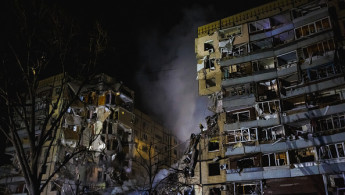Ukraine puts Dnipro toll at 21 after wave of Russian strikes
Ukraine said on Sunday that the death toll had risen to 21 after a Russian missile slammed into a tower block in the city of Dnipro during a massive wave of strikes causing power outages and blackouts across the war-torn country.
Ukrainian officials said more than 40 people were still missing after the Dnpiro strike Saturday, which came as Ukraine celebrated the Old New Year, a popular holiday, and as Britain became the first Western country to offer Kyiv the heavy tanks it has long sought.
At least 21 people were killed and 73 others wounded in Saturday's attack on the Dnipro tower block, Ukraine's regional council head Mykola Lukashuk said.
A 15-year-old girl was among the dead, officials said, after dozens of people were pulled from the rubble.
"Rescue operations continue. The fate of more than 40 people remain unknown," regional governor Valentyn Reznichenko said Sunday.
Rescuers battled through the night in a bid to free a woman trapped under the rubble after hearing her voice, the state emergency service said.
The strike destroyed dozens of flats in the Dnipro apartment block leaving hundreds of people homeless, said Kyrylo Tymoshenko, a senior official at the presidency.
The Ukrainian army said the block was hit by an X-22 Russian missile that it lacked the capacity to shoot down.
British tanks
"Only anti-aircraft missile systems, which in the future may be provided to Ukraine by Western partners... are capable of intercepting these air targets," it said.
Ukrainian President Volodymyr Zelensky on Saturday pleaded for more Western military weapons, saying that Russian "terror" could be stopped only on the battlefield.
"What is needed for this? Those weapons that are in the warehouses of our partners," Zelensky said.
On Saturday, British Prime Minister Rishi Sunak pledged to provide Challenger 2 tanks to Ukraine, the first Western country to supply the heavy tanks Kyiv has been demanding.
The tanks would arrive in Ukraine in the coming weeks, Downing Street said, adding that Britain would also train the Ukrainian Armed Forces on how to use them.
Russia's embassy in Britain warned that "bringing tanks to the conflict zone, far from drawing the hostilities to a close, will only serve to intensify combat operations, generating more casualties, including among the civilian population".
Moldova, Ukraine's southwestern neighbour, said it had found Russian missile debris on its territory after Saturday's strikes.
"Russia's brutal war against Ukraine directly impacts Moldova again," President Maia Sandu tweeted, posting photographs of the wreckage.
"We strongly condemn today's intensified attacks."
Energy infrastructure hit
Ukraine's energy facilities were still reeling Sunday from what was a 12th wave of large-scale Russian attacks on energy infrastructure in recent months.
The attacks targeted power infrastructure in the Kharkiv, Lviv, Ivano-Frankivsk, Zaporizhzhia, Vinnytsia and Kyiv regions, Energy Minister German Galushchenko said.
On Sunday, operator Ukrenergo said energy infrastructure was "being restored" but that the attacks had "increased the energy deficit".
"The period of outages may increase," it acknowledged.
On Saturday, Ukrenergo said emergency blackouts were introduced in "a number of regions".
Zelensky said Ukraine shot down 20 of the more than 30 Russian missiles fired.
"Unfortunately, energy infrastructure facilities have been also hit," he said, adding that the regions of Kyiv and Kharkiv, home to the country's eponymous second city, were suffering the most.





 Follow the Middle East's top stories in English at The New Arab on Google News
Follow the Middle East's top stories in English at The New Arab on Google News


